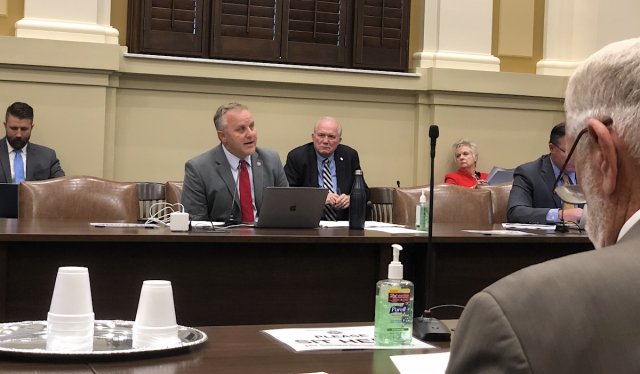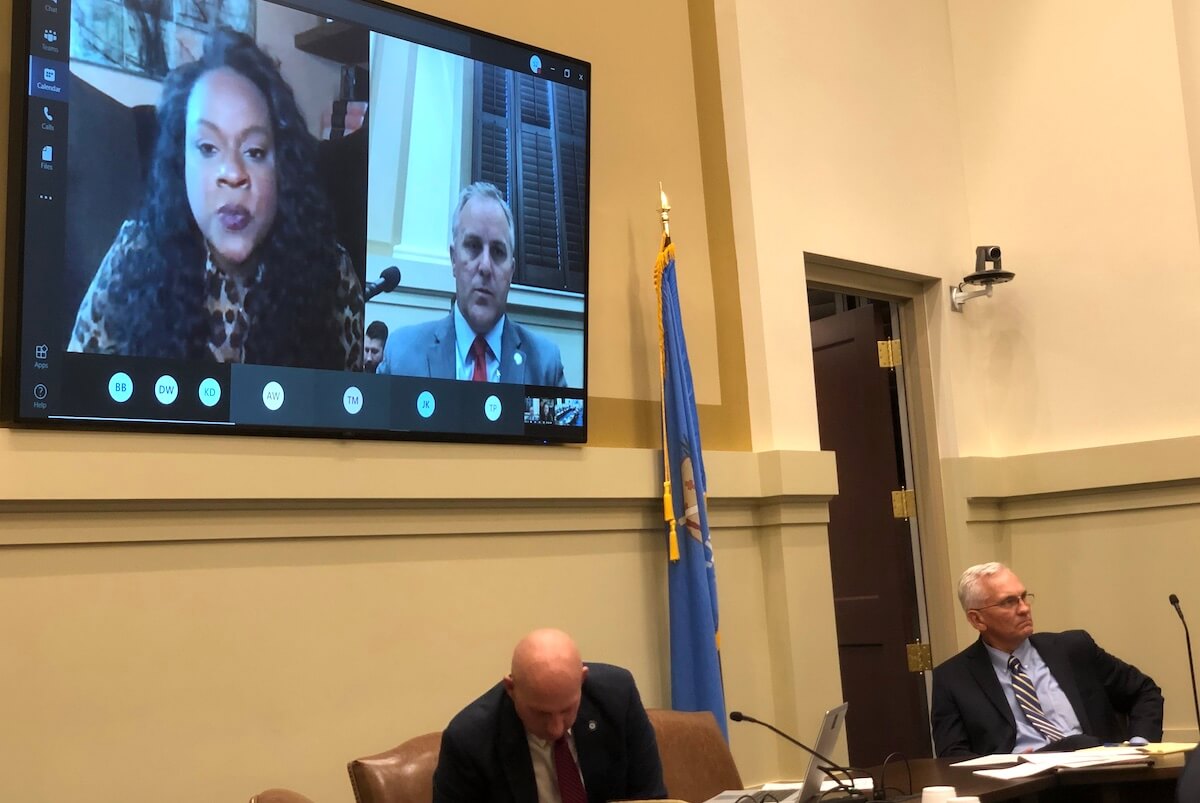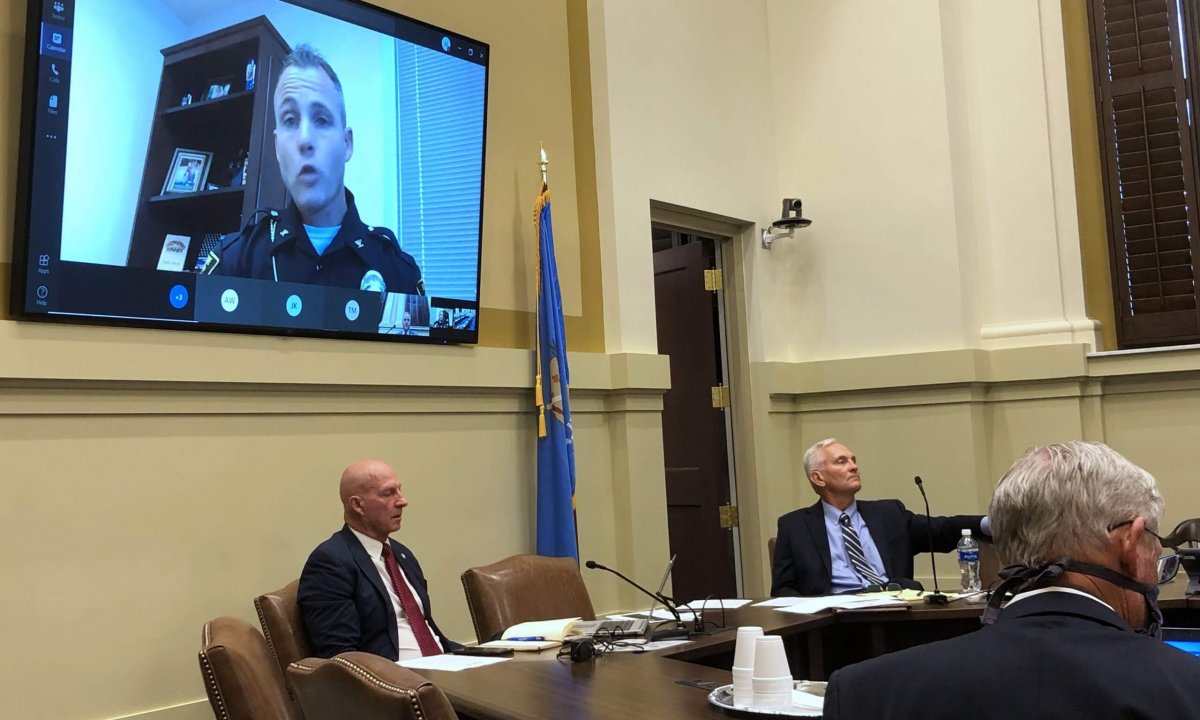
What changes to state law about police use of force might the Oklahoma Legislature consider during the 2021 session? Good question.
Senate President Pro Tempore Greg Treat (R-OKC) organized an interim study in the Senate Public Safety Committee today in an attempt to foster discussion about options on the topic and learn what other states have done in the past four months.
“I don’t have any predetermined outcome of this meeting. It’s truly part of the national discussion and state discussion. As I go around the state people are talking about the use of force and training for police officers,” Treat said. “There is a lot of support for law enforcement throughout the state but there is talk about reform.”
Treat noted that he selected presenters for the interim study who could speak to other efforts around the country so that lawmakers could “get ideas and truly study this issue.”
“I’m a blank slate today and am here really to listen,” he said.
A national perspective
Senators listened first to Amber Widgery, the criminal justice policy lead for the National Conference of State Legislatures, who provided an overview of states’ legislative efforts for police reform in 2020, many of which have occurred in special sessions since the topic drew national focus over the summer.
“Some of the states that have more robust reforms that have been put in place, like Colorado or Connecticut, they also have data components in place,” Widgery said when asked how states are tracking the outcomes of their changes.
She presented a PowerPoint document (embedded below) and broke down those changes among a few areas:
- oversight and data
- use of force (including chokeholds)
- duty to intervene, report and provide aid
- independent investigation and prosecution
- training
- officer certification and decertification
- body cameras
- alternative responses and officer wellness
Widgery said 34 states and the District of Columbia have introduced 594 new bills, 50 of which have now been enacted with 14 others awaiting final action.
“We’ve had a number of states in and out of special session to address policing,” Widgery said, calling that “extraordinary.”
She said 11 states have enacted new laws about use of force: Oregon, Nevada, Colorado, Utah, Minnesota, Iowa, New York, Vermont, New Hampshire, Delaware and Connecticut.
In Minnesota, a new law prohibits warrior-style police training. In Utah and Oregon, lawmakers restricted training on the use of chokeholds. In Iowa, lawmakers required new de-escalation training for officers.
Nevada, Colorado, Minnesota, New York, Vermont and Connecticut have enacted data tracking systems.
“The Colorado law requires creation of a publicly accessible database to share data on use-of-force,” Widgery said.
Colorado bill examined specifically

The Senate Public Safety Committee heard an in-depth discussion of the changes recently passed in Colorado as part of the Enhance Law Enforcement Integrity Act.
Rep. Leslie Herod (D-Denver) discussed the act in depth and answered questions from Oklahoma senators.
“We have to depoliticize this conversation. We only had two ‘No’ votes. Two ‘No’ votes total in the Senate,” Herod said. “So we need to depoliticize this conversation, and I believe that is the duty of all of us.”
Sen. Dave Rader (R-Tulsa) asked about how and why Colorado ended qualified immunity — a controversial protection where law enforcement officers cannot be personally held liable for their actions.
Herod said the Colorado reform implements a requirement that law enforcement carry private insurance and that eliminating qualified immunity requires more “personal responsibility.”
“But it’s also to bring in those private-market factors,” she said.
Earlier in the meeting, however, Sen. Darrell Weaver (R-Moore) spoke in favor of retaining qualified immunity in Oklahoma.
“I do agree wholeheartedly that there are a lot of areas we could improve on,” said Weaver, a former director of the state narcotics agency. “But qualified immunity is critical. It really concerns me when we start talking about that.”
Chief: ‘Acknowledge our history’ with policing

The committee heard from an active law enforcement leader in Oklahoma who also said he supports qualified immunity. But Moore Police Chief Todd Gibson — formerly the Cleveland County sheriff — also challenged the senators to face the sins of America’s past before trying to address “a complicated problem.”
“My view from the neighborhood I grew up in in Norman, Oklahoma, looks differently than someone else’s,” Gibson said. “The cruel reality is, law enforcement has not always risen to the level of professionalism that communities expect and has not always performed in the best interest of communities it serves.”
He spoke of how Black communities in particular remember the civil rights fight of the 1960s.
“You hear terms like institutional racism. There is merit to that within the realm of law enforcement. Law enforcement was the tip of the spear used to persecute that movement,” Gibson said. “We (must) acknowledge our history and we acknowledge that we were the tip of the speer doing some very atrocious things to United States citizens, to free men and women — or standing complicit. We have to recognize that.”
But Gibson also ran down a litany of responsibilities that modern society has placed on law enforcement: responding to disasters, mental health cases and active shooter situations; providing social work assistance; working in the modern media and social media environment and adapting to technology.
“And we’re asking this in many cases of 25, 26 and 27 year old men and women, and we are asking them to do this with a 0 percent failure rate. We are asking them to be almost super-human,” Gibson said. “It’s a very difficult task when we set the zero failure rate. Humans are imperfect. Law enforcement spends a lot of time trying to humanize the badge. The reason we do that is we want people to know we are not without sin, and we are not without failure.”
With committee members voicing their closing remarks — largely wanting to support law enforcement while also trying to address issues and increase accountability — Weaver shared a personal story.
“I remember as a junior narcotics agent walking down a hallway and watching someone use excessive force, and I made a decision then that I was going to report them,” Weaver said. “And I paid a heavy price for that for a long time in my career. It turned out OK, and I ended up on top. But we have to make an environment (of accountability).”
Treat said he does not anticipate dropping the Colorado bill verbatim into a Senate bill next year. But he said he does want conversation and intentional effort.
“I feel it is important to have difficult discussions within the Senate on these issues. It’s something we need to do,” said Treat, whose brother is a law enforcement officer. “Where we can learn from our colleagues around the country about what is happening, I am open to those discussions, and I want to have tough discussions in the Senate.”
NCSL document regarding state actions





















